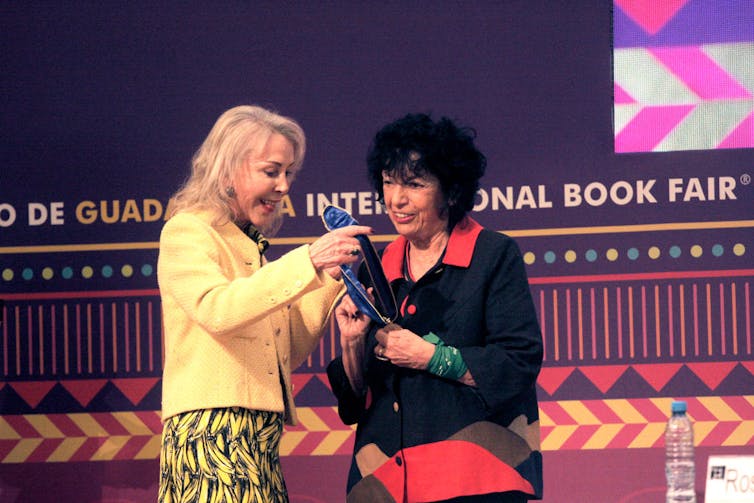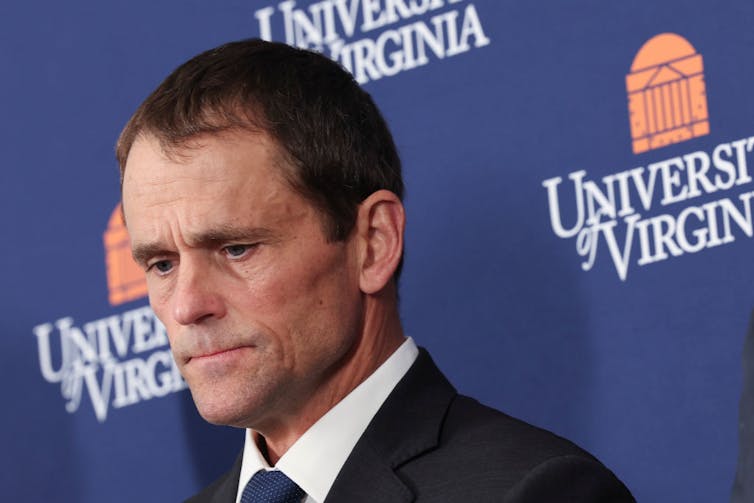Latin American literature contains warnings for American universities that yield to Trump
- Latin American literature offers warnings for American universities that yield to Trump’s demands, highlighting the dangers of capitulation to authoritarian rulers and the erosion of institutional values.
- The stories of Peruvian novelist Mario Vargas Llosa, Colombian writer Gabriel García Márquez, and Argentine author Luisa Valenzuela feature characters who, like Juan in Valenzuela’s “The Censors,” become censors to appease their governments, leading to a loss of autonomy and ultimately, personal destruction.
- Universities in the US are facing similar pressures, with institutions such as Brown University, Columbia University, and the University of Virginia yielding to demands from the Trump administration, including changes to admissions practices, curricula, and diversity initiatives.
- The consequences of these compromises can be devastating, as seen in the case of University of Virginia President James E. Ryan, who resigned under pressure after his university adopted “institutional neutrality” and dismantled its diversity office at the behest of a conservative alumni group.
- Academic administrators must navigate this treacherous landscape, where the temptation to appease authoritarian demands can lead to a loss of academic freedom and the erosion of institutional values, threatening the very foundations of higher education.

As university leaders work to make deals with the Trump administration, many college presidents are at an ethical crossroads. On the one hand, they must do all they can to restore funding for vital research. On the other, they risk ceding to the demands of a president with views that don’t align with their missions.
As the fall semester begins, academic administrators could look to literature for guidance. Latin America’s rich archive of fiction over the past century features this dilemma in numerous stories about living under dictatorships.
Among many others, Peruvian novelist Mario Vargas Llosa, Colombian writer and journalist Gabriel García Márquez and Argentine author Luisa Valenzuela have mined the region’s turbulent political history to explore how authoritarian rulers bend institutional leaders to their will by cultivating fear.
Lessons from the bookshelves
In these works, some threats are more overtly coercive than others.
Vargas Llosa’s “The Feast of the Goat” details how Dominican dictator Rafael Trujillo reportedly fed insubordinate underlings to voracious crocodiles, an image that, for me, has echoes in Florida’s Alligator Alcatraz. In García Márquez’s “The Autumn of the Patriarch,” an illiterate strongman takes over all institutions to such an extreme that “él solo era el gobierno” – he alone was the government.
Yet to me, the greatest danger that Latin American literature foretells for higher education is the insidious way capitulation to authoritarians changes both individuals and institutions.
This is the subject of “The Censors,” a 1976 short story by Valenzuela. Back then, all but four Latin American countries were dominated by authoritarian regimes.
The main character in Valenzuela’s story is an average Joe – aptly named Juan – who writes a letter to his beloved Mariana, now living in Paris. Soon after he mails the letter, Juan is beset by fear that despite its innocuous sentiments, his message will be construed by authorities as subversive. He worries that secret military forces will fly to Paris and kidnap Mariana from her apartment. (Masked men forcing people into unmarked vehicles is a common sight in dictatorships, then and now.)
Juan decides he must “sabotage the machinery, throw sand in its gears.” So he becomes a censor for the regime in hopes of intercepting his own letter as it works its way through the painfully slow Post Office Censorship Division.
University leaders, much like Juan, begin with the best of intentions. They initially collaborate with the government’s demands because they want to protect the university’s mission.

Leonardo Alvarez Hernandez/Getty Images
But once the concessions are made, things begin to change.
In “The Censors,” Juan discovers he has a knack for redacting questionable letters. Assigned to a division that checks correspondence for explosives, he watches as a co-worker’s right hand gets blown off. Yet when a colleague tries to organize a demonstration advocating for safer working conditions, Juan reports him to the authorities and is rewarded with a swift promotion.
Juan justifies his opportunism as a one-off rather than a personal transformation: “Una vez no crea hábito” – “One time doesn’t create a habit” – he reassures himself as he leaves his boss’s office.
As he reaches the highest echelons of the censorship authority, Juan’s sense of purpose blurs beyond recognition. He now considers flagging subversive letters and condemning their authors to be “a truly patriotic task, both self-sacrificing and uplifting.”
At this exact moment, Juan encounters his own letter to Mariana. “Naturally,” the narrator declares acidly, “he censored it without regret.” In the last lines of the story, the narrator reveals that Juan was executed the following day.
Juan, Valenzuela concludes with devastating irony, is “one more victim of devotion to his work.”
Universities in the crosshairs
In his zeal to capitulate, Juan deals himself a death blow, and I can’t help but wonder if universities are heading down the same perilous path.
In an official statement, Brown University noted on July 30, 2025, that it will “comply with the Trump administration’s vision” on admissions practices. Likewise, Columbia University has agreed to direct governmental oversight of its Middle East studies department, while the University of Pennsylvania will no longer allow trans women on female sports teams.
At the University of Virginia, where I’m an associate professor of Spanish, President James E. Ryan resigned under intense pressure from the Department of Justice in June 2025.
For most of his seven years in leadership, Ryan set out to make the university more diverse and open doors for first-generation and low- to middle-income students.

Win McNamee/Getty Images
By the time of his resignation, however, the university had already yielded to demands from a conservative alumni group to de-emphasize the history of enslavement during campus tours. And it had adopted “institutional neutrality,” meaning it would no longer take a position on, say, mass starvation in Gaza.
In March 2025, the university’s governing board voted to dismantle the university’s diversity, equity and inclusion office at the behest of Virginia Gov. Glenn Youngkin.
Three months later, Ryan was gone.
More to come?
As the White House continues its pressure campaign, academic administrators may face more funding threats in the future. I worry that if humanities programs are cut – the University of Chicago just paused admissions to doctoral programs in literature, philosophy, the arts and languages, citing “this moment of uncertainty” – students will lose the opportunity to be introduced to works like “The Censors.”
Columbia maintains it has safeguarded academic freedom by making a deal. But as Wesleyan University President Michael Roth told PBS, the academic community remains skeptical about the durability of these agreements.
Perhaps some administrators believe, as Juan did, that “one time doesn’t create a habit.”
But higher education, I fear, is being swallowed by its leaders’ “devotion to their work.”
![]()
The perspectives in this article do not reflect the official position of the University of Virginia.
